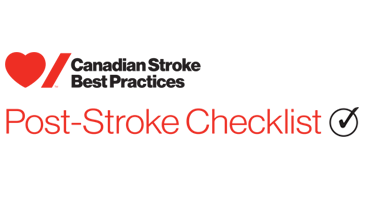The Canadian Stroke Best Practice Recommendations (CSBPR) are intended to provide up-to-date evidence-based guidelines for the prevention and management of conditions championed by the Heart and Stroke Foundation (including stroke, transient ischemic attack and vascular cognitive impairment, and considerations of related issues for people with these and heart conditions) and to promote optimal recovery and reintegration for people who have experienced or been affected by any of these conditions (patients, families and informal caregivers). Recommendations on the use of acetylsalicylic acid (ASA) for prevention of vascular events are a new addition to the group of recommendations included in the CSBPR portfolio. These recommendations are unique in that they do not focus just on stroke; rather, they are applicable to the prevention of a range of conditions including cardiovascular disease, cerebrovascular disease, vascular cognitive impairment, and peripheral arterial disease (PAD). This module was developed in response to compelling emerging evidence on the use of ASA for primary prevention, and an updated evaluation of the balance of risks and benefits of using ASA prophylactically for cardiovascular risk reduction. These recommendations have been developed in response to a need for guidance by healthcare professionals and the public following the publication of several recent research papers on this topic. Public information addressing this topic will also be updated based on the findings of this rigorous guideline development process.
Several organizations have been engaged with the development of these recommendations. This engagement promotes a single consistent message to health professionals and the public on this topic. The goal of developing, disseminating and implementing these recommendations is to optimize evidence-based care across Canada, reduce practice variations, and narrow the gap between current knowledge and clinical practice.
The theme of the Seventh Edition of the CSBPR is Building connections to optimize individual outcomes. The collaboration between several organizations in the development of these recommendations on the use of ASA for prevention of vascular events is an excellent example of building these connections. This collaboration strengthens the credibility and uptake of these recommendations by providing a consistent message across all represented disease groups. Members of the writing group for these recommendations, who are specialists in heart conditions, stroke and vascular cognitive impairment, report receiving many calls by their community-based colleagues to advise on the use of ASA in primary prevention.
The Seventh Edition of the CSBPR includes a broader wholistic focus that takes into consideration the heart-brain connection and issues of multimorbidity and increasing complexity of people who experience stroke, heart conditions and vascular cognitive impairment. This collaboration and these recommendations on ASA provide a further demonstration of the heart-brain connection, a priority theme in which Heart & Stroke has launched a multipronged approach to build awareness and integration in research, systems planning and change, and care delivery. In addition, within the Seventh edition, a more purposeful review of sex and gender representation in the seminal clinical trials upon which the recommendations are based has been undertaken to determine the extent to which available evidence has included both male and female subjects in sufficient proportions to be able to detect outcomes and generalize to a broader population. These findings are presented in the discussion sections of the module and integrated into the actual recommendations where appropriate to do so.
The detailed methodology and explanations for each of these steps in the development and dissemination of the CSBPR is available in the Canadian Stroke Best Practices Recommendations Overview and Methodology manual available on the Canadian Stroke Best Practices website.
Conflicts of Interest: All potential participants in the recommendation development and review process are required to sign confidentiality agreements and to declare all actual and potential conflicts of interest in writing. Any conflicts of interest that are declared are reviewed by the Chairs of the Best Practices Advisory Committee and appropriate Heart & Stroke staff members for their potential impact. Potential members of any writing group who have conflicts that are considered to be significant are not selected for advisory or writing group. Participants who have conflicts for one particular topic area are identified at the beginning of discussions for that topic, and if it is the chair, then another non-conflicted participant assumes the chair role for that discussion to ensure balanced discussions. Declarations of Conflict of interest for writing group members can be found in Appendix Two.
The Heart and Stroke Foundation of Canada gratefully acknowledges the ASA for primary prevention of vascular events writing group gratefully acknowledges the ASA for prevention writing group leaders and members all of whom have volunteered their time and expertise to the update of these recommendations. Members of the Canadian Stroke Consortium, Canadian Cardiovascular Society, Thrombosis Canada, and the Canadian Society of Hospital Pharmacists were involved in all aspects of the development of these recommendations. We thank the Canadian Pharmacists Association for their review of the draft guidelines. These recommendations underwent external review by Lana Castellucci, Robert Cote, Kim Connelly, John Eikelboom, Michael E Farkouh, Karen Harkness, Robert Hegele, Andrew Krahn, Gabriela Lewin, Louise McCullough, Wieslaw OczKowski, Stephen Phillips, Heather Purvis, Elissa Weinberg, Heather Williams, Arden Berry, Ellen Penny, Anne Simard, and Cindy YY Yip. We thank the Canadian Stroke Best Practices and Quality Advisory Committee members, including Eric Smith, Anita Mountain, Leanne K Casaubon, Gord Gubitz, Dar Dowlatshahi, Dylan Blacquiere, Thalia Field, Louise Clement, Farrell Leibovitch, Christine Papoushek, Jeffrey Habert, Barbara Campbell, Joyce Fung, Michael Hill, Tim Hillier, Thomas Jeerakathil, Eddy Lang, Pascale Lavoie, Beth Linkewich, Colleen O’Connell, Melanie Penn, Jai Jai Shankar, Debbie Timpson, Theodore Wein, and Katie White for their internal review and guidance throughout this process. We acknowledge and thank Norine Foley and the evidence analysis team at workHORSE; Laurie Charest of Heart & Stroke for her coordination of the CSBPR teams and processes; and the Heart & Stroke internal teams who contributed to the development of these recommendations and publication: Communications, Creative Services, Translation, Promote Recovery, Health Policy and Digital Solutions.
Community Consultation and Review Panel (CCRP) members
Heart & Stroke is grateful to the CCRP members who reviewed all sections of this module in parallel to the expert writing group, shared their personal experiences and insights on what did or would have made their journey optimal. The members of the Use of Acetylsalicylic Acid (ASA) for Prevention of Vascular Events CCRP included: Cheryl Beattie, Jennifer Bogart, Dan Dobbin, Glen Hilton, Judy Hilton, Allan Morrison and Anjie Valgardson (Methodology for the CCRP will be available soon - Lindsay et al, 2020 submitted for publication).
These guidelines are endorsed by the Canadian Stroke Consortium, Canadian Cardiovascular Society, Thrombosis Canada, the Canadian Society of Hospital Pharmacists, the Canadian Pharmacists Association and the Nurse Practitioners’ Association of Ontario.
Theodore Wein (First Author), M Patrice Lindsay (Corresponding Author), Norine Foley, David J Gladstone, Alexandre Poppe, Alan Bell, Leanne K Casaubon, Shelagh Coutts, Jafna Cox, James Douketis, Thalia Field, Laura Gioia, Jeffrey Habert, Eddy Lang, Shamir Mehta, Christine Papoushek, William Semchuk, Mikul Sharma, Jacob Udell, Stephanie Lawrence, Anita Mountain, Gord Gubitz, Dariush Dowlatshahi, Andrea de Jong, Anne Simard, and Eric E Smith (Senior Author) on behalf of the Prevention of Stroke Writing Group module 2019. In M. Patrice Lindsay, Anita Mountain, Gord Gubitz, Dariush Dowlatshahi, and Eric E Smith (Editors), Canadian Stroke Best Practice Recommendations Seventh Edition; on behalf of the Canadian Stroke Best Practice Advisory Committee, 2020; Ottawa, Ontario Canada: Heart and Stroke Foundation of Canada. In collaboration with the Canadian Stroke Consortium.
We invite comments, suggestions, and inquiries on the development and application of the CSBPR. Please forward comments to the Heart and Stroke Foundation’s Stroke Team at strokebestpractices@heartandstroke.ca.





